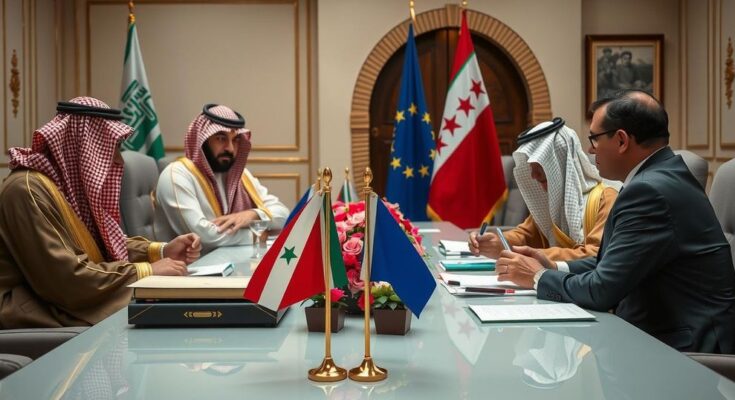Diplomats from Arab nations and the EU convened in Saudi Arabia to discuss Syria’s future following the fall of Bashar al-Assad. The talks, structured into two sessions, aim to foster regional cooperation and address the prospect of lifting sanctions in response to a newly formed inclusive government. The ongoing Syrian conflict has resulted in significant humanitarian crises and displacement of millions.
On Sunday, diplomats from the Arab nations and the European Union convened in Riyadh, Saudi Arabia, to deliberate on the ongoing situation in Syria following the recent leadership changes. The discussions are structured into two distinct sessions, the first of which will focus solely on Arab officials, and the second will expand to include representatives from various global powers, including Turkey, France, the European Union, and the United Nations, as reported by a Saudi official to Agence France-Presse.
The meeting occurs in the wake of significant political shifts in Syria, with the new leader, Ahmed al-Sharaa, advocating for the lifting of sanctions that were previously imposed on the Assad regime due to its violent suppression of protests beginning in 2011. This brutal crackdown spiraled into a protracted civil war, resulting in over half a million fatalities, extensive economic devastation, and a refugee crisis that has seen millions displaced, many of whom have sought refuge in Europe.
Kaja Kallas, the European Union’s high-ranking diplomat, noted that there is potential for the 27-member bloc to ease sanctions should the new Syrian authorities enact measures fostering an inclusive government that upholds the rights of minorities. This shift indicates a possible reopening of diplomatic channels as the international community seeks to stabilize Syria’s political landscape.
The ongoing conflict in Syria, which began in 2011, has been marked by severe humanitarian crises and widespread suffering. After the fall of former President Bashar al-Assad, whose administration is accused of severe human rights violations, there exists an urgent need for international dialogue among regional and global players. The dialogue is essential for establishing a new governance structure and promoting stability, with the international community cautiously considering relief from sanctions that have hindered economic recovery.
The diplomatic talks in Saudi Arabia signify a critical juncture in Syria’s recovery process following leadership changes. The discussions aim to address the ramifications of prolonged conflict and explore pathways for sanction relief contingent upon the establishment of an inclusive government. Moving forward, the commitment of both Arab and EU diplomats to engage in substantive dialogue will be pivotal in the pursuit of stability and peace in the region.
Original Source: www.scmp.com




